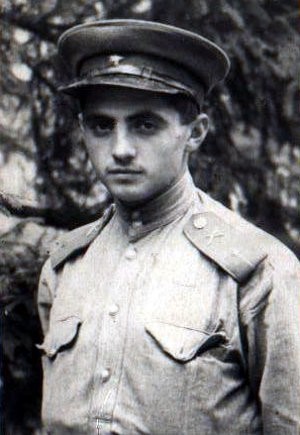Nuta (Nathan) Kling was born in 1924 in the town of Khmelnik, in the southwest Ukraine. His father Borukh, a blacksmith, had been a member of a local Jewish self-defense unit during the civil war in Ukraine (1918-20).
On June 24, 1941, the third day of the Soviet-German war, the local authorities assembled from the entire Khmelnik district young boys who had been born between 1923 and 1926, in a so-called "mobilization reserve" and sent them eastward on foot. Kling recalled this event as follows: "My father did not want to let me go to the east, but he listened to his brother, who said: 'Let him go, perhaps he will survive.' On that day I saw my family for the last time ... My parents and younger sister were killed by the Germans in the Khmelnik ghetto."[1] Kling's column, which had 250 young men, left Khmelnik and on the first day marched 20 kilometers. On the next morning the column was comprised of only 70 young men, mostly Jews. Almost all the Ukrainian boys had deserted, heading back to Khmelnik or their native villages. In the town of Poltava, in eastern Ukraine, all those born in 1923 were drafted into the Red Army, while the rest were sent to carry out agricultural work. Kling's second evacuation was in September 1941, when the Germans crossed the Dnieper River near Poltava: he was transferred to the Lower Volga region.
In August 1942, Kling was drafted into the Red Army. After five months of training, he was assigned to the 159th Separate Rifle Brigade as a member of a mortar crew. This brigade was supposed to advance westward through the Kalmyk Steppes, which were arid and sparsely populated. On the western edge of the steppes, where the population was denser, the Germans put up fierce resistance and the 159th Brigade sufferred heavy losses. In the winter of 1943, Kling took part in the Miuss River Operation, on the Russian-Ukrainian border. In the summer of 1943 he fought in south-eastern Ukraine (taking part in the liberation of the cities of Mariupol and Melitopol).
In March 1944 Kling was directed to an officers' course. He returned to the frontlines as a junior lieutenant. Kling fought in Yugoslavia and in Hungary and, in April 1945, in Slovakia. He was awarded the Order of the Red Star (for his service in Hungary) and some medals.
In the 1990s Nuta Kling immigrated to Israel.
[1] From the interview taken in 2011.







